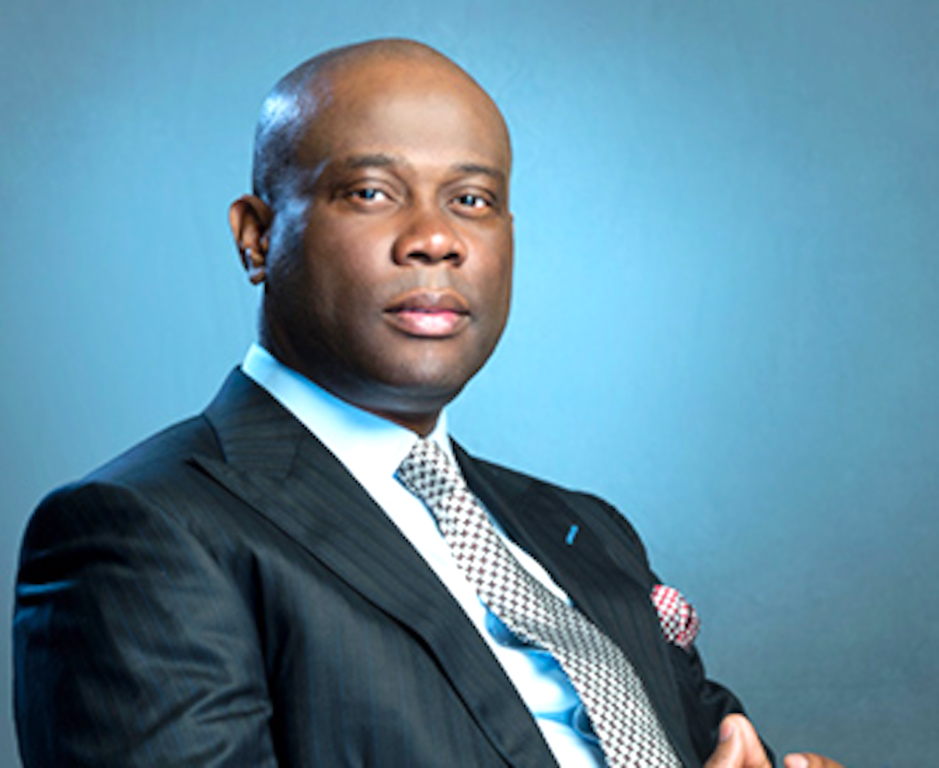The Chink ,The Clout in Herbert Wigwe’s Banking by Acquisition Model

Herbert Wigwe ,CEO of Access Bank Holding Company, may have decided to conquer the world ; with his weird banking model by acquisition inherited from his immediate predecessor , Aigboje Aig-Imoukhuede,he has succeeded in gathering stronger professional gravitas. However , while this has continued to give more sinew and sinecure to the bank’s balance sheet , it is equally raising a critical question: why should a bank’s profit engine or its strategic choice depends more on resources than resourcefulness? Definitely, this is a chink in the amour of Wigwe’s professional clout; and with this his desire to conquer the Nigeria’s banking world has remained highly elusive
The bank made N972billion as its gross earnings but ended up with N160billion profit after tax in its 2021 financial year results ; GTCO made N447.81b as its gross earnings and went away with N174billion profit after tax while Zenith Bank with N766billion finally made N244billion profit after tax .What these more savvy competitors are saying ,which is a fact , is that it’s not what you get but what you make out of it that matters.
Indeed, this banking model by chain of acquisitions is raising heated controversy and being trailed by mixed feelings . At the centre of the storm is the CEO, the strategic leader .Despite the scenario painted above ,to some analysts, Wigwe is an embodiment of prodigious talent. By sheer force of his personality he is believed to have rewritten the rules of the game and changed the industry leadership equations to his bank’s advantage by some analysts . Driven by his sound credentials, his capability and ability, particularly with his operating skills and strong attention to details that would make all the difference, Access Bank is said to be in a right hand. Access Bank’s CEO is regarded a master strategist and has become an enigma of sort ;this super banker has over the last decade believed to have shown a superhuman capacity for hard work, doggedness, and the deliberate pursuit of world-class performance.
A throwback to his laudable achievements confirms this as much. Most importantly , his capability to build the biggest bank by balance sheet size , to gather the biggest volume of deposits and revenues as well as an outstanding equity size which makes it the second biggest by equity capital in the industry are a confirmation of the above commendations. Access Bank Plc towered again above other banks in terms of balance sheet size in 2021 . Precisely ,its total assets hits N11.7trillion from N8.7 trillion in 2020 just as its total equity stands at N 1.1 trillion against N751 billion in the previous year .A puffy assets level could indicate improved strengths in mopping up transactions, including a better position in maturity transformation, – the stuff banks are best suited for. It can also mean that the bank has applied some elastic to its wings in the form of more customer touch points, branches and Point of Sale devices. For Access , it was all of these and more.
But on the other side of the argument, some analysts are pointing at certain chinks in his amour believed to impugn his capability and performance . Their argument could be better understood with an hypothetical viewpoint: “if one bank’s CEO could only achieve an income of N1 at a cost of 80k where his rivals effortlessly wring out the same amount with less than 20k , no better conclusion could be drawn from this than to tag his bank big but inefficient’’ ,an analyst explained. And more importantly, “ a major headache is that this is hitting too hard on the returns to the bank shareholders and given its rivals the much needed advantage to dominate where it matters most despite their smaller resources “,he added ..
Though the above logic may be hypothetical, in reality, this is the battle before Wigwe; his bank firmly controls the biggest revenues ,deposits and assets yet overtaken at the bottom line by its smaller rivals . The worry then remains, will he or the bank continue to acquire more banks indefinitely or will a savvy investor prefer his bank to a more resourceful entity ? Definitely no .
For this ,some analysts think Wigwe led management has more to learn from its better rivals who make the race for leadership a race of resourcefulness than that of resources and create better returns for their shareholders .Since this is Access Bank’s major drawback against its ambition to stay ahead of its competitors ,it must either work on its rough edges or its ambition remains a mirage .
To win a battle of this nature Wgwe led management may need to identify, combine, re-combine, and manage their resources, competencies and capability to explore their potentials and perform better than the competitors. Although an important strength for any organisation will be the achievement of critical success factors that allow it to cope better than rivals with any changes in its competitive environment,however, the advantage of an organization consists in identification of the internal core competences, mainly based on knowledge assets and intellectual capital, that align with the key success factors of the market that give competitive advantage, better performance and better market position. In a nutshell . a business entity is not expected to stop at critical success factors but to translate them to reality with appropriate core competencies ;savvy managers of any entity desirous of industry leadership are not oblivious of this fact .
Without this, the above critical success factors may not deliver the much needed leadership for any organization .Access Bank, indeed, has these performance requirements that are fundamental to an organization’s success and leadership ; but despite the above massive resources at Access Bank’s disposal ,its PBT was N176.7bn in 2021 while its earned N160.2bn in net income both far below some of its closest rivals with smaller resources .
Leading players in the corporate world are known to gain foresight and intellectual leadership, to actively shape the emergence of that future industry structure to their own advantage and gain market share and market position with fairly well defined parameters of value ,price, cost and service at the third stage .When these are aligned with the critical success factors leadership is delivered to such a business entity
With the above are in place , a player in an industry could gain a deeper understanding than its competitors on the trends and discontinuities ,transform industry boundaries and create new competitive space and as well to become prescient about the size and shape of tomorrow opportunities. These allow it to imagine new opportunity arena . This ,no doubt , is where Access Bank is having edge over its rivals and making mega bulk across the Afriacn continent that manifests in its copious gross earnings and assets .
But that is not enough; it also needs to accumulate more necessary competencies, overcome technical hurdle , test and prove out managerial concepts by progressively discovering a better profit engine . Moreover , while the competition for intellectual leadership and the competition to actively shape the emergence of that future industry structure to one’s own advantage are believed to largely settled among the among tier 1 banks , the battle for market share and market position with fairly well defined parameters of value ,price, cost and service is the most decisive and dynamic which ultimately determines the real industry leader . This where its leading rivals appear to be having an edge over it
This is not to claim that Wigwe led management is not putting any frantic efforts in all the above competitive stages ,however ,his critics with facts and figures believe his strategic choice relies more on acquisition than resourcefulness. Their argument is that while his capability to build the biggest bank by balance sheet size delivered the biggest revenues and deposits and enriched his professional clout it failed to generate proportional values for its shareholders compared to its closest rivals with smaller resources or assets.
Moreover , a major fear is that this may not be sustainable as the bank cannot continue to acquire other banks indefinitely.
A look into the operations of banks like Guaranty Trust Bank and Zenith Bank with largely organic growth structure and smaller assets than Access Bank shows they give better values and returns to their investors. To catch up with these rivals and overtake them ,if possible , Wigwe has no option than to work on the profit engine of his bank . The reason behind this assertion could be situated on its relatively unimpressive returns to shareholders and values created compared to its massive assets
ACCESS BANK’s 2021 RESULTS:BIG ASSETS ,LESS EFFICIENT PROFIT ENGINE
Where in the bank’s income streams is Wigwe led management getting is wrong ? .In the core banking segment, Access Bank is yet to get it right or to be competitive ; ironically this is the heart of banking where the mega bulk is delivered for it to the tune of N601billions in 2021.
No doubt , this is the toughest area in banking ,a hard nut for any banker . When it is said that one is good or astute banker ,what, in fact, is meant is that one is a shrewd lender ,one who lends money safely and profitably .Although other avenues are now emerging ,historically ,the major path to rapid professional advancement and high salaries as a bank employee is through lending function .The importance of lending in banking cannot be overemphasized .All the technical training that a banker receives is heavily geared towards lending .
Bringing Wigwe to judgment on the two critical success parameters of lending safely and profitably in the real sense of those words may call to question his proficiency as a super banker when it comes to how efficient he is using resources. .Benefiting from its size advantage, the bank’s gross loan book inched up to ₦4.6trn as at Dec’21 from ₦3.8trn in 2020 as its Net Loans & Advances increased by 23 % to N4.45trillion from N3.61trillion .No doubt , this is massive enough to be leveraged upon to give it the necessary sinew for much wanted industry leadership ; but this was not case in the last few years.
Moreover , this amount of loans or earnings assets deployed by it is just a little less than the total assets of GTCO , but Access Bank’s profit after tax is still below that of GTCO despite its heavy challenges in 2021. This might spring a surprise from anybody ; but this could be situated on its relatively inefficient profit machine
A look at Access bank’s profit engine performance from its interest expense margin perspective exposes this bank’s chink in the business maturity transformation with better clarity. In 2021, interest expense margin ratio depreciated, indicating a decelerating efficiency of its profit margin as it expended N50 to wring out every N100 compared to N46 in 2020 ;this is before the operating expenses were settled .For this, one could say the bank is not exploiting its asset size advantage bestowed on by its chain of acquisitions with the much needed efficiency as the percentage of interest expense that goes into getting each Naira of its interest income is relatively high currently . To further appreciate the inefficiency of Access Bank in the core segment of banking or lending business is to compare it with GTCO ,one of its rivals which utilized only N17 to get N100 within the same period of 2021. With better leverage ,this would have given it its much needed industry leadership. Ability to leverage their resources better is the secret behind better profitability of both Zenith Bank and GTCO despite Access Bank’s being the biggest bank
A detailed analysis shows although Access Bank’s Net Interest Income, usually driven by interest-earning asset volume and the net yield available on these assets after taking into account the cost of funding, rose by 15% from N262.95b to N301.46b .
However , a look into its net interest margin at 4.3 % and 32% increase in loan impairments exposed Wigwe led management less impressive banking skill in the core banking segment relative to its closest rivals . While this NIM is a positive figure and means that the investment decisions were successful or that the company was profitable, this is too cold for comfort. This means that for every N100 of invested assets (loans to bank customers) the bank made N4.30K of interest income after all interest expenses had been paid ;this means the bank did not make very good investment decisions last year or used its resources effectively to generate a strong NIM above 4.3% return. This is where boys are separated from men in banking; it is the hardest nut that many banks CEOs find difficult to crack including Herbert Wigwe .
It is not unusual most CEOs are known to always pass the bulk when faced with this reality . Access Bank is putting the blame on the industry institutional factors attributing its failure to decline in assets yields and rise in the cost of funds ..Between 2020 and 2021 assets yield declined by 41bps year on year from 9.0% to 8.6% in the period which the bank attributed to the decline in yields on government securities in the period and lending to investment grade names ; within the same period its average Cost of Funds increased marginally by 11bps y/y to 3.4%, resulting from the 35% increase in its funding sources and its deliberate efforts to lock in pricing for term deposits to take advantage of flat yield curve .
This ultimately led to Net Interest Margin moderating by 54bps y/y to 4.3%, due to the combined effect of the decline in yields and increase in cost of funds. In the last three years its assets yield nosedived from 12.8% to 9.0 % and 8.6%% while its cost of funds followed the same trend from 5.0% to 3.3% and 3.4 %
Looking at the above from another perspective, the first signal from the above scenario that is palpable from the bank’s balance sheet in 2021 is the gap between interest income and net interest income created by high interest expenses . Enhanced by high volume of loans deployed by the bank, than any other banks in Nigeria in 2021 , its interest income inched up by 23% to N601.7 billion . However , interest expenses which could be situated on the falling yields on earning assets jumped at greater paces at 33% to hit N300.24b in 2021 from N226.27b .
The direct impact of this could be seen on its net interest income which increased at lower rate or paces at 15 % to N301.46b from N262.95b . While a the bank’s was saved by 32% y/y growth in income from Investment Securities due to the enlarged investment portfolio and 20% y/y growth in interest on Loans and Advances beefed up the interest income but more by increased in the volume of loans deployed ; but a 21% y/y decline in income from Cash and Cash equivalents was a big spoiler
This indicated that the bank did not put up a good fight in its battle of interest rate This may be situated on the failure of the bank management in putting together an appropriate internal fund transfer pricing, a method used by bankers to evaluate the profitability of deposits and loans ;an inappropriate or artificial internal funds pricing policy can drive poor business decision-making; strong bankers are known to create and implement a more robust and disciplined internal funding framework.
. The same thing happened in the other leg of the battle for interest income which is the credit battle as its loan loss impairment record skyrocketed by 32 % from N62.89b to N83.21 bn with its direct negative impact on its net profit .
FEES AND COMMISSIONS – BIGGEST POTENTIALS
However , where the power of volume aided Access Bank resides in the fees and commissions income segment or non interest income .This could be linked to its ability to leverage series of its acquisitions to gain better tractions in transactions . Its non-interest income increased by 34% year on year level to N370.1b in the 2021 financial year . This was driven by a 48% y/y increase in other operating income to ₦65.9bn, including the Bargain Purchase from Acquisition in the period of ₦2.5bn and recoveries from written off loans ,36% y/y increase in Fee and Commission income to ₦159.2bn (FY’20: ₦116.7bn), on the back of increased adoption of our channels and velocity of transactions and 27% y/y increase in Net Trading income to ₦145.0bn (FY’20: ₦114.3bn) on the back of efficient treasury activities
Fee revenue is generated from the sale and provision of financial services to customers. The level of fees and commissions will be communicated in advance to customers. Fee income, separate from trading income and known as non-interest income, is desirable for banks because it represents a stable source of revenue that is not exposed to market risk. It is also attractive because it provides an opportunity for the bank to cross-sell new products and services to existing customers, and the provision of these services does not expose the bank to additional credit or market risk. Fee income represents diversification in a bank’s revenue base
OPERATIONAL COSTS-ANOTHER BIG THREAT
While its performance in the non interest income segment is impressive and commendable though linked to the power of volume driven by acquisition ,another hard nut difficult for Wigwe remains the operating cost debacle . Growth in Operating expense by 14% y/y to ₦371.1bn (FY’20; ₦326.5bn), driven by the high inflationary environment, exchange rate movement, and the enlarged franchise following the recent acquisitions .Despite the increase in Operating Expenses, its Cost to Income ratio reduced significantly by 454bps y/y to 58.8% (FY’20: 63.4%) .The Cost of Risk also grew by 25bps y/y to 2.0%, on the back of the increase in impairments on loan The effects of these percolated down to the bottom line and inflicted a deep cut on its earnings per share ,dividend yield ,share price and market values
BIG ASSETS .LESS RETURNS AND VALUES
Investors in the equity of banks are looking at good returns on their invested capital, not the size of a bank’s assets or deposits . A good way to determine earnings to the investor is the Earning Per Share (EPS), which is the monetary share value, i.e., what every share issued by the bank will receive from declared earnings. The higher the EPS, the more profitable the bank is. Though Access Bank controls the largest assets ,in the full year 2021 , while EPS for GT Bank is 6.14 per share and for Zenith Bank 7.78 ,for Access Bank it is 4.58. Access Bank situation could be situated on its lower net profit ; this is in spite of gathering the largest gross revenues .This means that investors holding shares of Zenith and GT Bank get more values .
ACCESSCORP’s current net profit margin which is 29.1% though higher than last year 23.1% impacted negatively on its ability to deliver competitive returns to its shareholders relative to its closest rivals for the reason above . This could not spring any surprise as its net profit lost its potential momentum or traction gained at top line due a relative inefficient deployment of resources .
In terms of cash value to the investors or dividend yield, Zenith Bank delivered 12.47% while GT Bank at 12.24 % to its shareholders per share and displayed superior returns compared to Access bank with 9.76% as dividend yield per share .Divided Yield is important because it brings in the market price of the bank stock and the cash dividends paid by the bank, this is most useful because it indicates the actual cash that flows back to the investor.
Though ACCESSCORP’s dividend payments are well covered by earnings, its payout ratio at 21.8% is considered low . Moreover , ACCESSCORP’s forecast earnings growth (0.4% per year) is below the savings rate (13%).Sequel to this it is better to invest in Fixed Income than in Access Bank because investors could get a higher yield at a lower price. Moreover, ACCESSCORP’s forecast earnings growth at 0.4% per year are forecast to grow slower than the market at 14.3% per year just as its revenue (9% per year) is forecast to grow slower than the market at 10.8% per year .
Access Bank’ returns to shareholders are reflected on its Price to Earnings Ratio (P.E.) ,a useful metric in determining how “cheap” or expensive a stock is. Looking at the P.E ratios of the these three banks Access Bank is cheaper not necessarily because the market price is cheaper .Zenith Bank posts a lower P.E of 3.2x , while GTBank posts a P.E. of 3.0x as Access Bank posts 2.2x. Zenith Bank is trading currently at N24.85 as of April 20th and GT Bank at N24.50 while Access Bank is trading N10.25 .
This is equally confirmed by its price to book ratio at 0.3x compared to the industry average at 0.6x . .However , while some investors would prefer an undervalued shares like those of Access Bank, this is not automatic as its fundamentals are critical determinants in making such a decision . The fact remains that investors may prefer its rivals’ stocks based on their better fundamentals that manifest in better dividend yields and capital gains .
Moreover ,Access Bank stock is a poor value based on its price/earnings to growth ratio, PEG Ratio at 5.9x. PEG ratio, is a stock valuation measure that investors and analysts can use to get a broad assessment of a company’s performance and evaluate investment risk. A PEG ratio higher than 1 are generally considered unfavorable, suggesting a stock is overvalued. Conversely, ratios lower than 1 are considered better, indicating a stock is undervalued.
By the values created and returns to its investors as indicated above relative to its closest rivals with smaller assets , it is crystal clear that maintaining large asset and deposit base or massive equity, though are critical success factors , do not demonstrate that a banker or bank is extraordinary; it is not the amount of resources at a banker’s disposal but what is made out of those resources ; it is resourcefulness not resources alone that delivers leadership.






